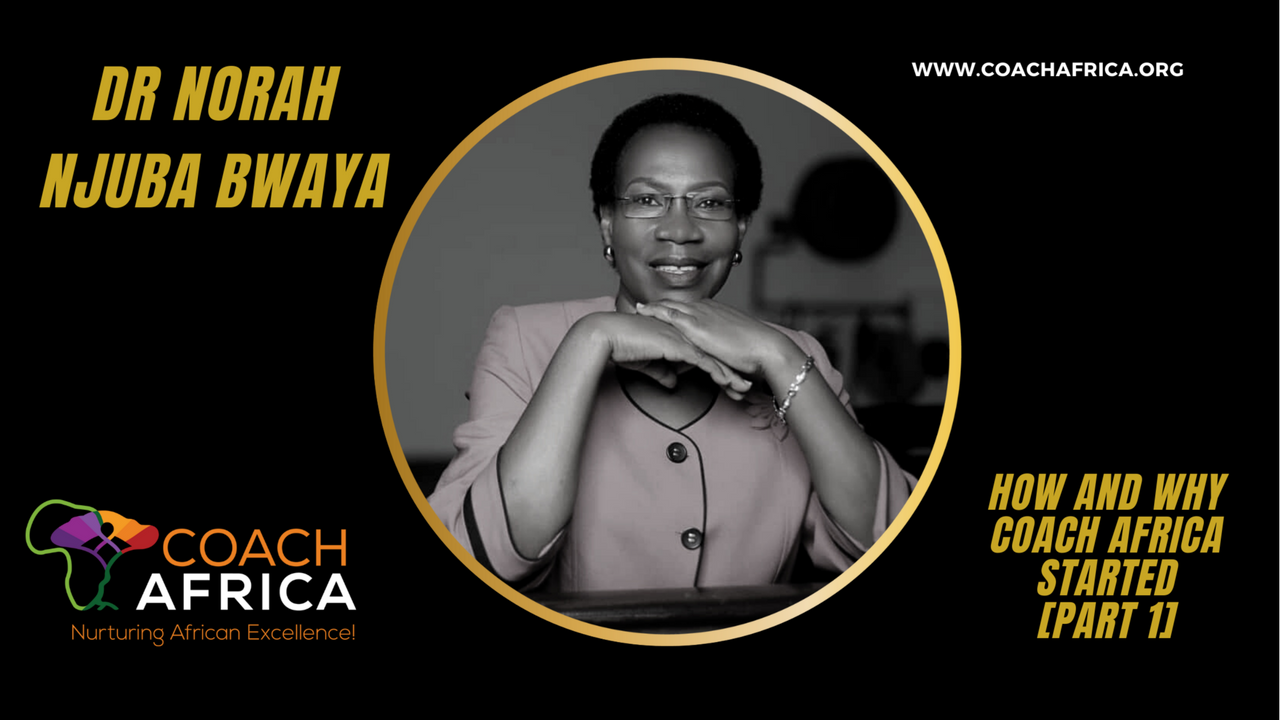How and Why Coach Africa started [Part 1]

How and Why Coach Africa started [Part 1]
An interview with Coach Africa Founder, Dr Norah Njuba Bwaya by Lexis Koufie-Amartey
Like most folks who feel called to the wild and wondrous world of coaching, Dr Norah Njuba Bwaya deeply craved a rich, full-flavoured, meaningful experience of life. One that was going to help people go from overwhelmed and overworked to focused and free. One that was going to support individuals who were - or wanted to be - dynamic “transformation artists.”
"Earlier in my career, I was responsible for sales teams in 3 large private sector organizations, in succession – 2 of them were large multi-national corporations. In the last one, I had the responsibility of retail teams in 8 countries. I needed to find effective capacity building solutions that would deliver sustainable results across the variety of working cultures. As I was looking for effective solutions to this, I was also searching for a change in career and looking for something related to people and organization development. Luckily, I got the support of a job coach that helped me to articulate what I needed. That is how I was introduced to the world of corporate coaching in 2004," she says. "Finally, I came across an intervention that really made a difference in people development. I decided to get into coaching to introduce the industry to my country and scale the benefits of coaching."
But the realization that coaching was something she needed to do didn't see Dr Bwaya leap into it right away. It took months for her to have it figured out. And that period came along with a lot of pain, mistakes, trials and errors.
"When I learnt that there was a budding profession called ‘coaching’, I spent the first few months seeking information about it. The more I discovered, the more I confirmed it was my destiny. However, getting the right instruction as a coach proved very complicated, even when I had the money to take on a course. There were no accessible training institutions for coaching in my country at the time. I had a young family, so could not travel overseas for studies for 9 months. A year later, I came across one institution that had what they called "tele-classes" running a 9-month coaching program that was ICF certified. I took it and graduated in 2006," Dr Bwaya narrates.
"I did a lot of in-house coaching for the last organization I worked for. As my experience grew, I got more and more hooked on coaching. I was always amazed at the results it was producing. The employer I had did not buy my idea when I proposed that we start a whole new function for coaching leaders. Eventually, I decided to start a company that offered coaching so that I could do more of what I loved. That was the birth of Coach Africa in 2006."
Dr Bwaya was convinced she had found her true passion of transforming people and organizations –– helping, serving, and creating an impact in the world, while conquering their personal and organizational dreams. But it came with hurdles and roadblocks.
"I had expected that I would start my business, take whatever time necessary to market it, offer the best coaching services, and build a scalable business model. It was important for me to be engaged in a venture I loved, and offering a service that would transform results for both executives and their organizations," Dr Bwaya recalls. "The start was extremely difficult. Coaching was little known the world over at the time, and was non-existent in Uganda. Starting a service that people did not know meant that I had to give free services to almost every new client. I had to attach coaching to skills development because that is what clients knew and could understand. Originally, I offered the coaching service free - as an add-on service. With time, the add-on service was being more appreciated than the main service."
The complications were getting thicker. "Running a business was very hard. The coaching school equipped me to be a good coach, but not how to run a business. My previous work was in a huge multi-national corporation; a completely different ball game. Starting as a sole entrepreneur in a new industry meant I had to do everything myself. It took longer to grow a stable stream of income to allow me the luxury of employing other people," Dr Bwaya recalls. "The worst part was; I left my great job planning to become a full-time coach. I discovered soon that I needed to offer other services that clients were willing to pay for. It felt like I was doing everything else except coaching! Things I didn’t enjoy as much such as; filing tax returns, doing research for the skills development workshops I was running, the list is endless. I had also not planned for the huge administrative tasks that go with running a business. For the first 2 years, I did less coaching and more of other services – that was painful."
In Part II, we’ll tell you what she wished she had done differently, what the impact goal for Coach Africa is, and how the business has ended up transforming people and institutions in private, public and development sectors around Africa.
